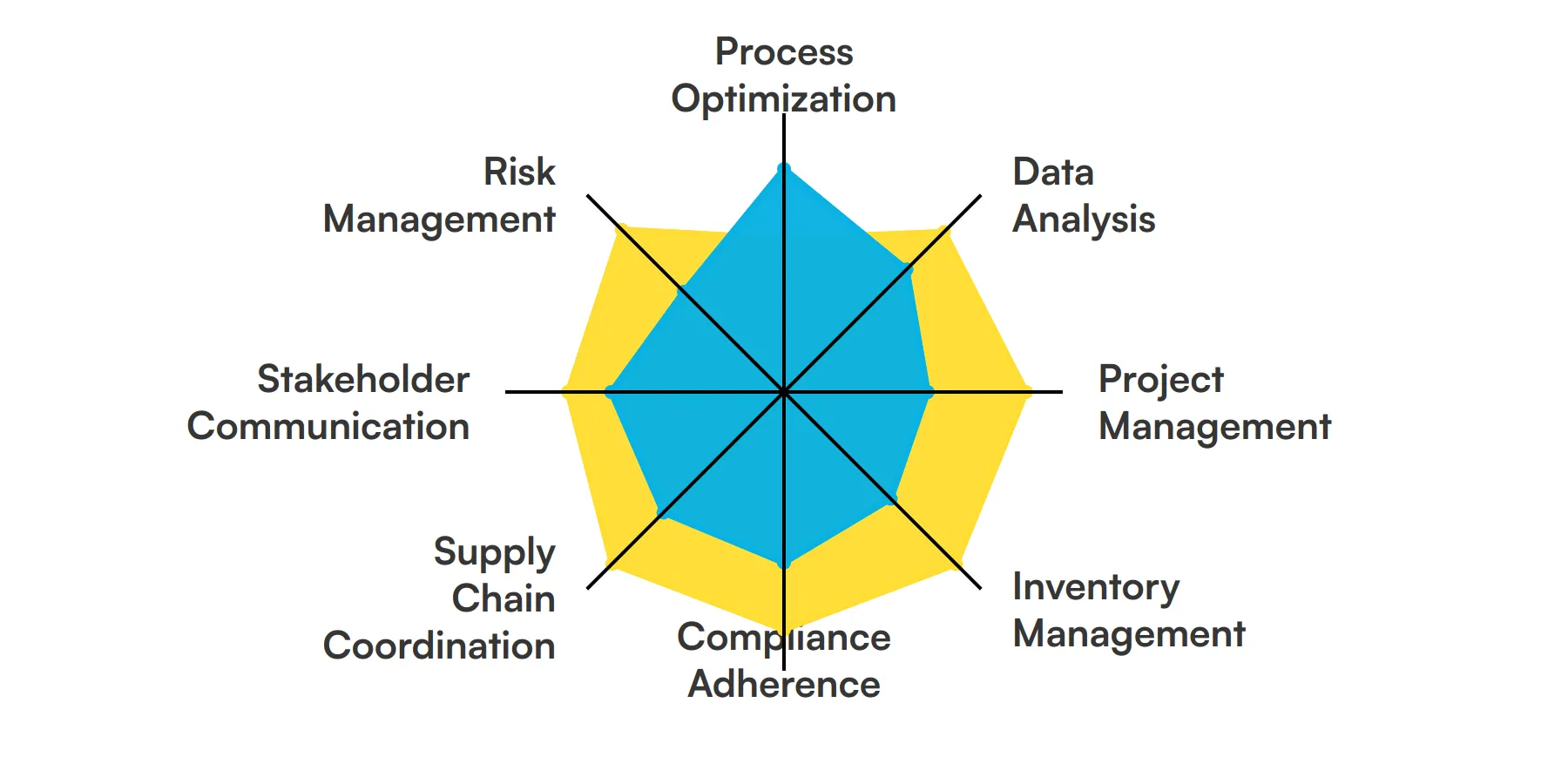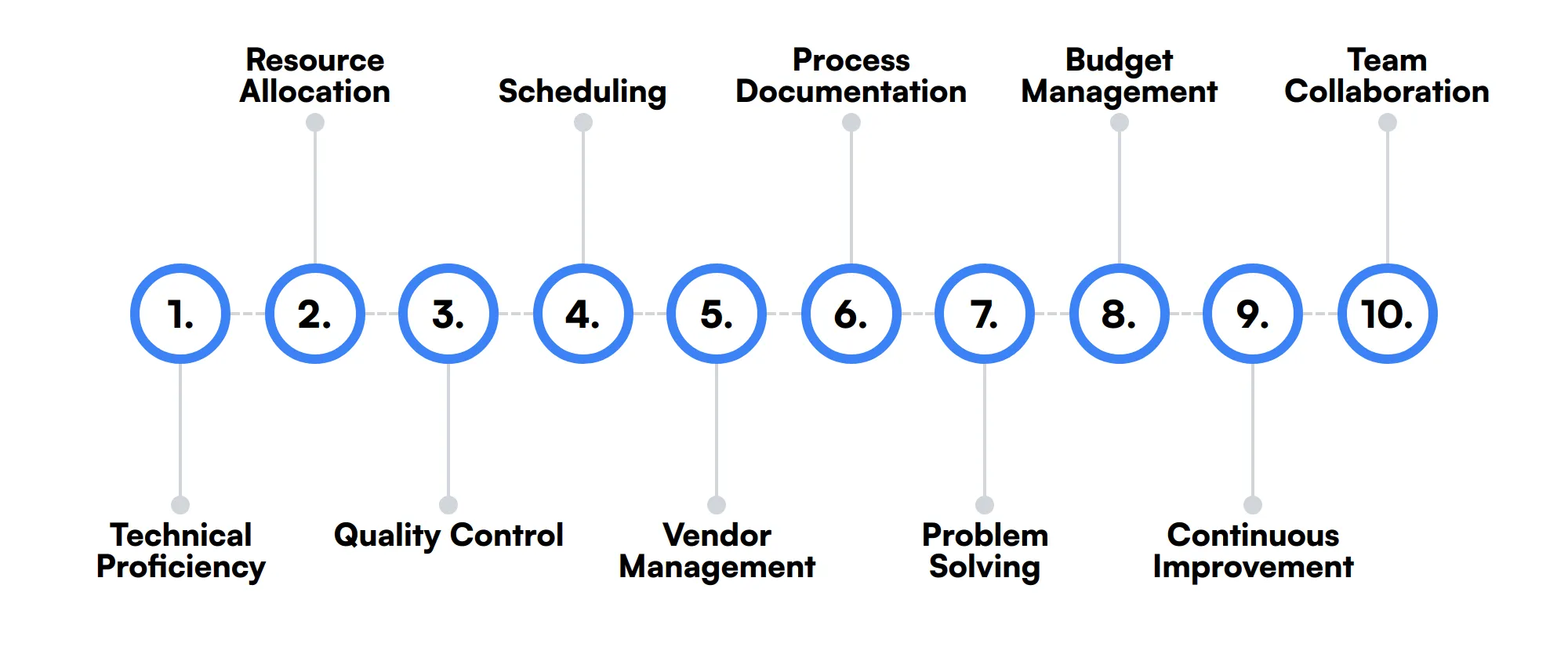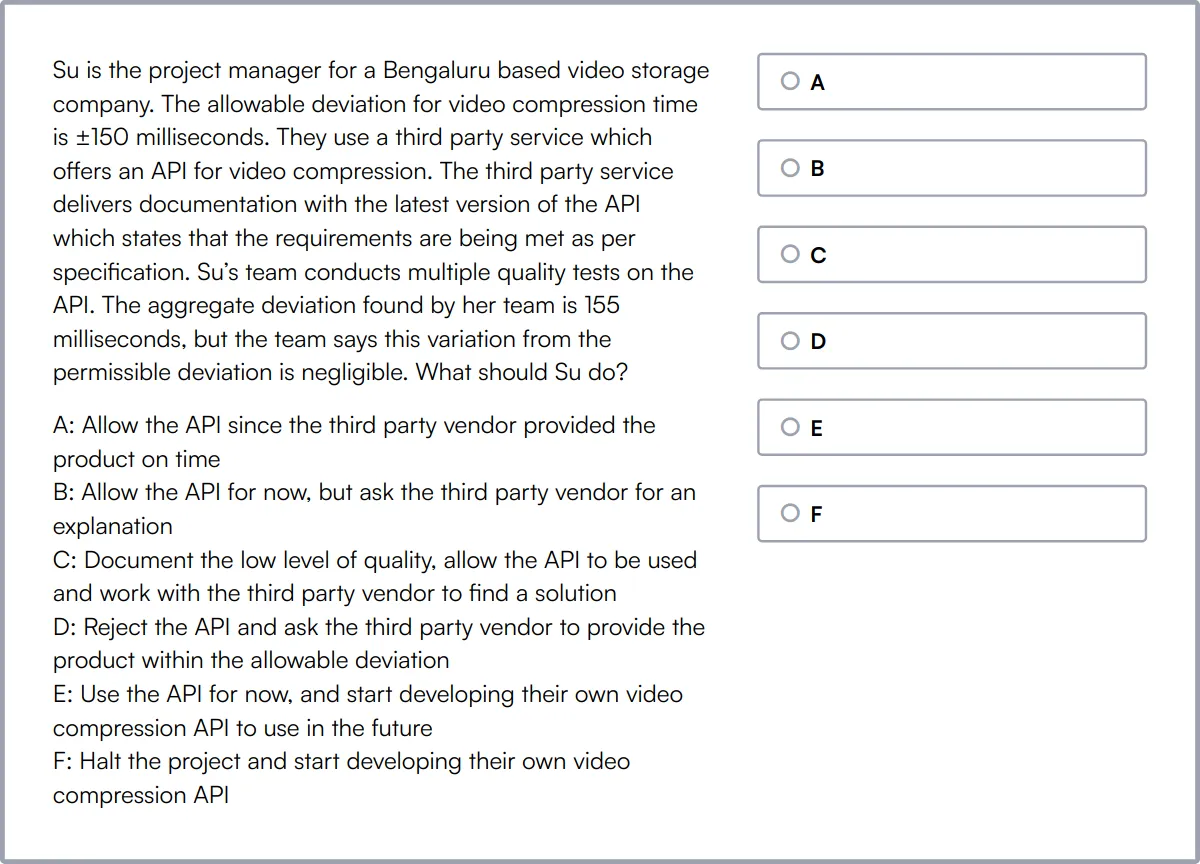Operations Specialists are the backbone of any organization, ensuring that daily operations run smoothly and efficiently. They handle a variety of tasks, from managing logistics to coordinating between different departments, making sure that everything is in sync and functioning properly.
The skills required for an Operations Specialist include strong organizational abilities, attention to detail, and excellent communication skills. They must also be adept at problem-solving and have a good understanding of the business processes to keep everything on track.
Candidates can write these abilities in their resumes, but you can’t verify them without on-the-job Operations Specialist skill tests.
In this post, we will explore 8 essential Operations Specialist skills, 10 secondary skills and how to assess them so you can make informed hiring decisions.
Table of contents
8 fundamental Operations Specialist skills and traits
The best skills for Operations Specialists include Process Optimization, Data Analysis, Project Management, Inventory Management, Compliance Adherence, Supply Chain Coordination, Stakeholder Communication and Risk Management.
Let’s dive into the details by examining the 8 essential skills of a Operations Specialist.

Process Optimization
An Operations Specialist must streamline processes to enhance efficiency and reduce costs. They analyze existing workflows, identify bottlenecks, and implement solutions to improve operations, ensuring the organization runs more smoothly.
For more insights, check out our guide to writing a Process Analyst Job Description.
Data Analysis
Data drives decisions in operations. An Operations Specialist uses analytical tools to interpret complex data sets, helping the team understand performance metrics and make informed decisions that align with strategic goals.
Project Management
This role requires overseeing projects from inception to completion. The Operations Specialist ensures that all project milestones are met on time and within budget, coordinating with different departments to achieve these goals.
Inventory Management
Effective inventory management is key to avoiding surplus and shortages. The Operations Specialist monitors and analyzes inventory levels to optimize stock and ensure availability of necessary materials without overstocking.
Compliance Adherence
Maintaining compliance with laws and regulations is critical. The Operations Specialist ensures that all company operations adhere to legal standards and industry regulations to avoid legal issues and maintain operational integrity.
Supply Chain Coordination
Coordinating supply chain processes is essential for timely delivery of products and services. The Operations Specialist works to synchronize supply chain activities to enhance efficiency and meet customer demands effectively.
Stakeholder Communication
Clear communication with stakeholders is crucial for an Operations Specialist. They must effectively convey information and updates to stakeholders to ensure alignment and address any concerns promptly.
Risk Management
Identifying and mitigating risks before they become issues is a key responsibility. The Operations Specialist assesses potential risks in operational processes and develops strategies to minimize their impact on the organization.
10 secondary Operations Specialist skills and traits
The best skills for Operations Specialists include Technical Proficiency, Resource Allocation, Quality Control, Scheduling, Vendor Management, Process Documentation, Problem Solving, Budget Management, Continuous Improvement and Team Collaboration.
Let’s dive into the details by examining the 10 secondary skills of a Operations Specialist.

Technical Proficiency
Understanding and utilizing relevant technology and software is important for efficiency in operations.
Resource Allocation
Effectively distributing resources, including human capital and materials, to maximize productivity.
Quality Control
Ensuring that all output meets the established standards of quality to satisfy customer expectations and maintain brand reputation.
Scheduling
Creating and maintaining schedules for staff and operations to ensure optimal workflow and resource use.
Vendor Management
Managing relationships with vendors to secure the best terms and ensure supply continuity.
Process Documentation
Creating detailed documentation of operational processes to ensure consistency and facilitate training and process improvement.
Problem Solving
Addressing and resolving issues that arise during operations quickly and effectively to prevent disruption.
Budget Management
Monitoring and controlling expenditures to keep operations within financial targets.
Continuous Improvement
Constantly seeking ways to improve operational processes and efficiency.
Team Collaboration
Working closely with other departments and team members to achieve common goals and optimize operations.
How to assess Operations Specialist skills and traits
Assessing the skills and traits of an Operations Specialist can be a challenging task, given the diverse range of competencies required for the role. From process optimization to risk management, each skill plays a significant part in ensuring smooth and efficient operations within an organization.
Traditional resumes and interviews often fall short in providing a comprehensive view of a candidate's abilities. This is where skills-based assessments come into play. By leveraging tools like Adaface assessments, you can gain a clearer understanding of a candidate's proficiency in key areas such as data analysis, project management, and stakeholder communication. These assessments can lead to a 2x improved quality of hires and an 85% reduction in screening time.
In the following sections, we will explore various methods and best practices for evaluating the essential skills and traits of an Operations Specialist. Whether it's through practical tests, scenario-based questions, or behavioral interviews, you'll find actionable insights to help you make informed hiring decisions.
Let’s look at how to assess Operations Specialist skills with these 6 talent assessments.
Aptitude Test for Auditors
Our Aptitude Test for Auditors evaluates candidates on their proficiency in auditing, including financial statements analysis, internal controls, and compliance with international auditing standards.
The test assesses candidates' understanding of auditing principles, risk management, fraud detection, and regulatory compliance. It challenges them to identify control weaknesses, evaluate audit evidence, and communicate findings effectively.
Successful candidates demonstrate a thorough grasp of auditing standards and accounting regulations, ensuring compliance and adeptness in fraud prevention.
Data Analysis Test
Our Data Analysis Test measures a candidate's ability to analyze and interpret data using tools like SQL and Excel, crucial for roles requiring data-driven decision making.
This test evaluates skills in data modeling, analysis, and interpretation, focusing on extracting insights, detecting anomalies, and using statistical methods to project outcomes.
Candidates excelling in this test are proficient in handling complex data sets and can effectively use data to inform business strategies.

Project Management Test
Our Project Management Test assesses a candidate's ability to oversee projects from inception to completion, ensuring they meet budget, timeline, and quality requirements.
The test covers key aspects of project management, including risk analysis, stakeholder management, and resource allocation. It challenges candidates to demonstrate their skills in situational judgement and task prioritization.
High-scoring candidates show strong capabilities in managing complex projects, adept at navigating challenges and delivering successful outcomes.

Management Trainee Test
Our Management Trainee Test is designed to identify potential managers by evaluating their problem-solving, decision-making, and leadership skills.
Candidates are tested on their analytical abilities, critical thinking, and communication skills, reflecting their potential to handle managerial responsibilities.
Those who perform well on this test typically exhibit strong leadership qualities and the ability to think strategically in complex scenarios.
GDPR Online Test
Our GDPR Online Test assesses candidates' knowledge of data protection laws and practices, focusing on GDPR compliance.
The test evaluates understanding of data privacy, security, and breach management, ensuring candidates can manage and protect sensitive information according to legal standards.
Candidates who excel in this test demonstrate a comprehensive understanding of data protection regulations and the ability to implement GDPR-compliant processes.
Microsoft Dynamics 365 Supply Chain Management Functional Consultant Test
Our Microsoft Dynamics 365 Supply Chain Management Functional Consultant Test evaluates candidates on their expertise in Dynamics 365 for supply chain management.
The test assesses knowledge in supply chain planning, inventory management, and procurement, focusing on the candidate's ability to optimize and manage supply chain operations effectively.
Successful candidates demonstrate proficiency in using Microsoft Dynamics 365 SCM to enhance operational efficiency and meet business requirements.
Summary: The 8 key Operations Specialist skills and how to test for them
| Operations Specialist skill | How to assess them |
|---|---|
| 1. Process Optimization | Evaluate ability to streamline and enhance operational processes. |
| 2. Data Analysis | Assess skills in interpreting and leveraging data effectively. |
| 3. Project Management | Check proficiency in planning, executing, and closing projects. |
| 4. Inventory Management | Review capability to manage and optimize stock levels. |
| 5. Compliance Adherence | Test knowledge and application of legal and regulatory standards. |
| 6. Supply Chain Coordination | Examine coordination and management of supply chain activities. |
| 7. Stakeholder Communication | Observe effectiveness in communicating with diverse stakeholders. |
| 8. Risk Management | Determine skill in identifying and mitigating risks. |
Call Center Supervisor Test
Operations Specialist skills FAQs
What are the key skills needed for an Operations Specialist?
Operations Specialists require skills in process optimization, data analysis, project management, and inventory management. They also need to be adept at compliance adherence, supply chain coordination, and stakeholder communication.
How can you assess problem-solving skills in Operations Specialists?
Assess problem-solving skills by presenting candidates with real-world scenarios related to operational challenges. Evaluate their approach to identifying issues, analyzing data, and proposing viable solutions.
What role does technology play in the effectiveness of an Operations Specialist?
Technology is integral for efficiency in roles like Operations Specialist. Technical proficiency helps in managing databases, using project management software, and understanding automated systems for better decision-making.
Why is team collaboration important for an Operations Specialist?
Team collaboration ensures that operations are carried out smoothly, with all team members aligned on goals and processes. It helps in sharing insights, solving problems collectively, and improving overall productivity.
How can compliance adherence be measured during the recruitment process?
During interviews, ask candidates about their experiences with regulatory frameworks relevant to your industry. Assess their understanding of compliance protocols and their ability to implement these in day-to-day operations.
What is the importance of risk management for an Operations Specialist?
Risk management is critical as it helps in identifying potential threats to the business and developing strategies to mitigate these risks. It ensures stability and continuity in operations.
How does an Operations Specialist contribute to continuous improvement?
An Operations Specialist drives continuous improvement by analyzing current processes, identifying inefficiencies, and suggesting enhancements. This ongoing process helps in optimizing operations and increasing productivity.
What tools and techniques are essential for effective inventory management?
Effective inventory management can be achieved using tools like ERP systems, barcode scanners, and inventory management software. Techniques include JIT (Just-In-Time) inventory, ABC analysis, and demand forecasting.

40 min skill tests.
No trick questions.
Accurate shortlisting.
We make it easy for you to find the best candidates in your pipeline with a 40 min skills test.
Try for freeRelated posts
Free resources



